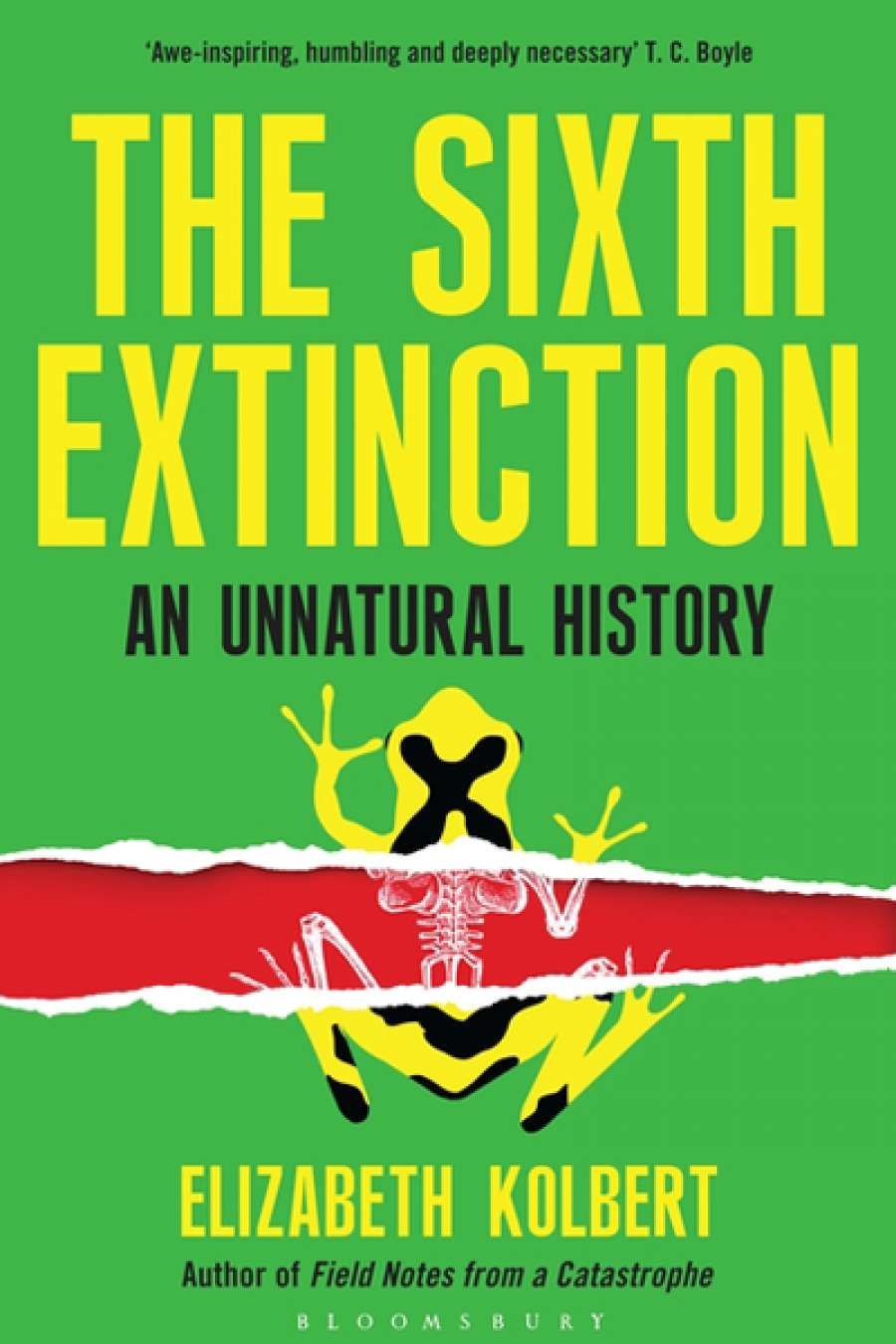
- Free Article: No
- Contents Category: Science and Technology
- Custom Article Title: doug Wallen reviews 'The Sixth Extinction'
- Review Article: Yes
- Article Title: The sixth extinction
- Online Only: No
- Custom Highlight Text:
When the world changes faster than species can adapt, many fall out,’ writes Elizabeth Kolbert towards the end of her study on the mounting wave of extinction we are living through – and causing. The list of species dispatched by humans, directly or indirectly, is growing every day, yet Kolbert isn’t merely ringing alarm bells or giving a dour post-mortem. As the book’s subtitle suggests, she is interested in the history of extinction itself, from the very concept (which isn’t nearly as old as you might think) to its most dramatic examples to date.
- Book 1 Title: The Sixth Extinction
- Book 1 Subtitle: An Unnatural History
- Book 1 Biblio: Bloomsbury, $29.99 pb, 319 pp, 9781408851227
The idea that we’re in the midst of a ‘sixth extinction’ – following the so-called ‘Big Five’ – has been around for years. In 1995, Richard Leakey and Roger Lewin published a book called The Sixth Extinction with the subtitle Patterns of Life and the Future of Humankind. The impetus for Kolbert’s book is the sweeping disappearance of Panamanian golden frogs, discovered to be caused by an ‘unstoppable’ fungus introduced by man-made ‘intercontinental reshuffling’. It’s just one example of how mankind’s world travel has reversed the distribution of species established long ago by continental drift, wreaking havoc on ecosystems.
Kolbert’s quest takes her from Peru and Paris to Iceland and New Jersey, from remote islands to the thick of the Amazon rainforest. She also visits the University of Sydney’s One Tree Island research station on the Great Barrier Reef to help understand the spiking acidification of the oceans. The sheer variety of destinations and topics gives The Sixth Extinction the feel of a survey more than that of an in-depth study. But this chimes with her target of educating a mass audience rather than catering to the scientific community. And there is no doubting Kolbert’s skill at reducing complex ideas into digestible portions; staff writer at The New Yorker since 1999 and author of Field Notes from a Catastrophe: Man, Nature, and Climate Change (2006), she has won multiple awards for science writing.
That said, Kolbert has a habit of indulging in what is, arguably, superfluous information, such as what her sources look like and what they are wearing. Instead of setting the scene, this tends to be distracting, while the recurrence of insignificant extras undermines the tone for what is very dire subject matter. A certain glibness is part of Kolbert’s style, including a jokey casualness and her approach of alternating facts and history with a kind of first-person travelogue. The books reads a bit like a punchy television documentary, jumping from background statistics to the requisite field reporting while remaining decidedly plainspoken.
If that approach helps to earn a wider readership, though, it is worth a few passing instances of annoyance for those craving a more serious tone. The facts illuminated here are both frightening and in serious need of sharing. They include grim projections as to how many species global warming will eliminate this century and the wide impact of the recent spike in carbon for both the air and oceans. For example, the last time carbon dioxide levels were as high as today was likely fifteen millions years ago. For all the inbuilt endurance of species thanks to natural selection, the usual rules don’t apply in times of ‘extreme stress’, and what we’re doing to the planet right now qualifies as just that.
In fact, there is a growing movement to reassign the current geological epoch from the Holocene to one called the Anthropocene, defined by mankind’s influence. Whether that epoch began with the world-altering effects of the Industrial Revolution or even thousands of years prior, with us gradually wiping out the megafauna, is still being debated. Whatever the exact delineation, Kolbert argues that we are not only undoing ‘millions of years of geographic separation’ but thriving at the cost of all other life. Humans have ‘succeeded extravagantly at the expense of other species’, notes author David Quammen, while Kolbert discovers that ‘man was a killer pretty much right from the start’.
The impact of mankind on the planet can’t be overstated; what we do today will shape the world for millions of years to come. Consider that the select plants and animals that survived the Ordovician extinction of more than four hundred million years ago ‘went on to make the modern world’ – in the words of British palaeontologist Richard Fortey – and it becomes clear that the future will be defined by however few species are able to survive through the conditions we have wrought. Already an introduced fungus is killing off bat communities, similar to the golden frogs, while larger animals like bears and big cats are increasingly endangered.
Kolbert does a remarkable job of weaving landmark theorists of past centuries into the current discourse. A key lesson is that the fields of ecology, geology, and biology are always works in progress. Indeed, Kolbert highlights the scornful tone of rival theorists over the centuries; ‘The arrogance of those people is unbelievable,’ said one palaeontologist in 1980, reacting to the now-popular theory that a meteorite ended most life at the close of the Cretaceous Period.
The seeming naïveté of that quote reminds us that it takes years, decades, even centuries to settle on accepted truths about the ever-changing earth. In the case of our own rapidly escalating situation, and how we might find a solution to the damage, that could very well be time we don’t have


Comments powered by CComment